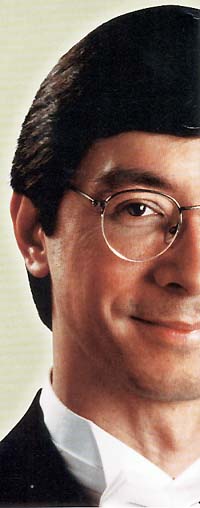On His Toes
By Robi Polgar, Fri., Nov. 13, 1998
 At long last, after months of waiting, after months of driving downtown past the banner at Symphony Square welcoming conductor Peter Bay to Austin, the Maestro has arrived where he belongs: on the podium. On Thursday night, November 5, at Bass Concert Hall, Bay conducted his first performance since being named as music director of the Austin Symphony Orchestra (ASO). (Well, his first evening concert, anyway -- Bay leaped into the conducting fray a couple of days earlier at the AISD Fall String Festival, putting a few hundred school-age orchestrians through their paces.) Bay began his tenure at the ASO leading a technically adept, rejuvenated orchestra through works by three of this century's finest American composers. His energy and open enthusiasm for the evening's selections mark a wonderful future for Austin's flagship orchestra.
At long last, after months of waiting, after months of driving downtown past the banner at Symphony Square welcoming conductor Peter Bay to Austin, the Maestro has arrived where he belongs: on the podium. On Thursday night, November 5, at Bass Concert Hall, Bay conducted his first performance since being named as music director of the Austin Symphony Orchestra (ASO). (Well, his first evening concert, anyway -- Bay leaped into the conducting fray a couple of days earlier at the AISD Fall String Festival, putting a few hundred school-age orchestrians through their paces.) Bay began his tenure at the ASO leading a technically adept, rejuvenated orchestra through works by three of this century's finest American composers. His energy and open enthusiasm for the evening's selections mark a wonderful future for Austin's flagship orchestra.
Make no mistake: This was no easy beginning for Bay. The four complicated, buoyant works that Bay chose for his opening foray into Austin's classical music scene were even more daunting, perhaps, than leading hundreds of scholastic musicians at Zilker Park. This "All-American Evening" -- the latest in this season's symphony presentations focusing on composers from a particular country -- featured relatively difficult, modern works. And the Maestro seemed almost apologetic as he briefly introduced them -- Copland's Suite From the Tender Land, Barber's Symphony No. 1 in One Movement, Op. 9, Bernstein's Serenade (After Plato's Symposium), and Copland's Lincoln Portrait -- as if sensing the potential distance that his selections could create between his orchestra and the audience. He needn't have apologized. Clearly this is music he loves, and from the first flash of his baton, the audience was treated to a passionate evening of music, well performed by a solid orchestra that at first seemed unready for their conductor's exuberance but which quickly warmed to the task with an ever-growing confidence.
At once impish and powerful, Bay conducts with his whole body. From the opening stroke of Suite From the Tender Land, Bay stretched up onto his toes, where he seemed to stay for most of the livelier sections of the piece. During moments of Copland's barn-dance whimsy, he wagged his hips toward one part of the orchestra while keeping his eye fixed on another, exhibiting complete control as he connected with every musician. At moments of sweeping grandeur, when Copland's music brings to mind the endless horizon and simple majesty of the American prairie, there was Bay, equally grand: arms wide, body swaying, at times larger than life -- a field of wheat, bending in the summer breeze. Where the music exploded like fireworks, Bay showed his compact power, demanding and receiving the perfect punch from his orchestra with stabbing baton or closed fist, augmented by crashing timpani and pounding percussion. It is an infectious energy that Bay exudes in leading his orchestra: Above all, it appears that he is having a great time, and the symphony responds enthusiastically.
If the Suite From the Tender Land exhibited Maestro Bay in full variety of motion and control, the more challenging Barber Symphony saw him equally powerful in his compact, energetic way. While clearly in charge, he deferred generously to his soloists among the woodwinds, making sure that each received his or her due following the piece. The piece itself, Samuel Barber's Symphony No. 1, is at once hauntingly disturbing and rhythmically complex. Not necessarily material suited to the average concertgoer. But Bay and his orchestra succeeded in performing a tightly woven and intense work in an eminently satisfying fashion.
After the interval, Bay returned accompanied by Cho-Liang Lin, featured artist for Bernstein's Serenade, a five-movement piece for solo violin, string orchestra, harp, and percussion. Each movement is named for a participant at a Greek banquet in honor of the poet Agathon, where Socrates and company discuss love and beauty. The mood of each movement varies to match the tenor of the discussion, Bernstein developing the musical themes of the preceding movement as a starting point to each successive movement. The piece, then, allows for a variety of moods, though an overall sense of playfulness (we're talking about love here) reigns. Once again, Maestro Bay displayed his generosity as he shared the stage with the gifted Lin. No longer the sole focal point, yet still quite clearly in command, his movements became abbreviated, gestures shortened, allowing the audience to view Lin's own elegant and playful performance as the highlight of Bernstein's piece. The exchanges between Lin and Bay during the more charming sections hinted at a shared joke: Lin, smiling at Bay, eyebrow arched, his playing exquisite; Bay in turn peeking over his shoulder at the minimalist Lin's deft bow work. Lin possesses the gift of making the challenging appear simple with smooth, controlled bow strokes and seeming ease of fingering on his gorgeous, 18th-century violin, the Guarneri del Gesu "The Duke of Camposelice." Bursting in as a drunken revelry toward the end of the final section of Serenade, titled "Socrates; Alicibiades," is an allegro that includes strains of jazz -- for Bernstein, not anachronistic Greek party-music but rather the natural expression of a contemporary American composer imbued with the spirit of that timeless dinner party. The same appreciative spirit might be credited to Bay, too: The rousing climax of the piece saw three percussionists racing a furious relay between drums and xylophone as the Greeks' tribute to love erupted in a celebratory finish. Whew!
If possible, the American-ness of the evening seemed to grow with each successive selection, culminating in the fourth and final piece, Copland's Lincoln Portrait. The reassembled orchestra (brass and woodwinds having returned) was joined by narrator Franchelle Stewart Dorn, who interspersed excerpts from Lincoln's speeches and letters during another of Copland's sometimes panoramic, sometimes down-home musical escapades -- without straining, one could hear the folksy melody to "Camptown Races" mixed into Copland's salutary work. Perhaps not the strongest concluding piece, but possessed of a combination of stateliness and neighborliness that are hallmarks of the evening's American composers.
This was brave music, bravely performed, and an auspicious opening for what should be one of Austin's brightest artistic lights. Future evenings this season continue the national themes: Next up is Germany, with works by Bach, Beethoven, and Brahms in early December, then France ("Vive la France!") in January, Spain ("A Latin Carnival") in February, Italy ("Salute to Spring" -- which includes Vivaldi's Four Seasons for you populists) in March, and a hodgepodge of European lands ("The Grand Tour: A Musical Journey to Russia, Spain, and the British Isles") in April, all with Maestro Bay at the helm.
Bay and the Austin Symphony appear to be a ready match with room for some truly exceptional musical presentations. It was a pity, then, that so many empty seats greeted Bay upon his first entrance -- the vagaries of playing at the Bass on a home football weekend. Fortunately, the more traditional Friday night performance was a capacity house, and the remainder of the season appears football-free. In future, for those who would like to sample the symphony but are late making plans: Look for the next Thursday night. You'll be able to grab a seat and enjoy some emotionally and sonically satisfying music. Welcome, Maestro Bay, indeed.








